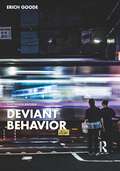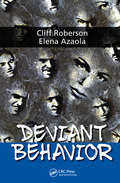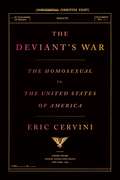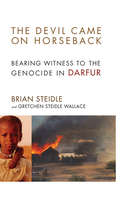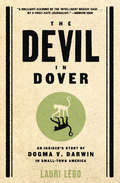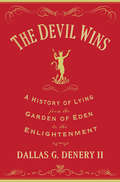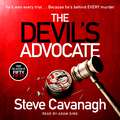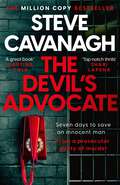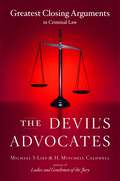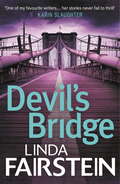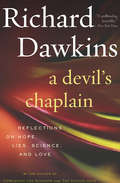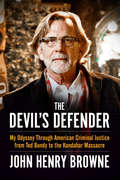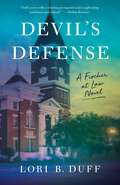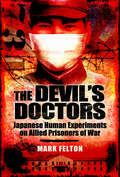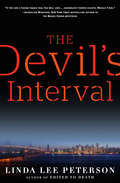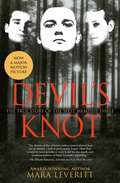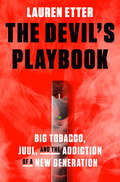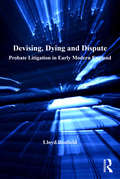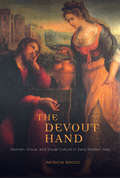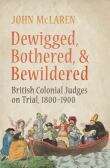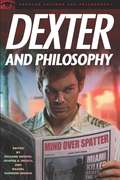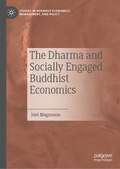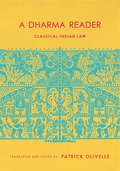- Table View
- List View
Deviant Behavior
by Erich GoodeThe new 2022 edition of the most widely taught deviance text brings us into a changing political era. A new chapter on political deviance includes a section that defines political deviance, emphasizing a sociological and not an ideological definition. It also covers which sectors of the society define what constitutes political deviance; and political deviance and its relation to social change. In addition, the chapter on substance abuse provides more discussion of marijuana legalization and decriminalization. Although disease as potential deviance has been covered, the COVID-19 pandemic greatly expands discussions on this topic. Updated throughout, this new edition includes expanded coverage of Black Lives Matter, sexual harassment, the social construction of immigration, and other topics. A new section on logic, reasoning, and verification of facts is an important new feature for student critical thinking while it addresses the recent politics of truth and lying, including QAnon.
Deviant Behavior
by Cliff Roberson Elena Azaola GarridoDeviant behavior is not a subject that you study in school and then file away. It is a study of life and is ever changing. Defining the concept of deviant behavior is one of the most difficult tasks to overcome when studying the subject. Sociologists probably disagree more over the meaning of deviant behavior than any other subject. Deviant Behavio
The Deviant's War: The Homosexual Vs. The United States of America
by Eric CerviniFrom a young Harvard- and Cambridge-trained historian, the secret history of the fight for gay rights that began a generation before Stonewall. <p><p> In 1957, Frank Kameny, a rising astronomer working for the U.S. Defense Department in Hawaii, received a summons to report immediately to Washington, D.C. The Pentagon had reason to believe he was a homosexual, and after a series of humiliating interviews, Kameny, like countless gay men and women before him, was promptly dismissed from his government job. Unlike many others, though, Kameny fought back. <p> Based on firsthand accounts, recently declassified FBI records, and forty thousand personal documents, Eric Cervini's The Deviant's War unfolds over the course of the 1960s, as the Mattachine Society of Washington, the group Kameny founded, became the first organization to protest the systematic persecution of gay federal employees. It traces the forgotten ties that bound gay rights to the Black Freedom Movement, the New Left, lesbian activism, and trans resistance. Above all, it is a story of America (and Washington) at a cultural and sexual crossroads; of shocking, byzantine public battles with Congress; of FBI informants; murder; betrayal; sex; love; and ultimately victory.
The Devil Came on Horseback: Bearing Witness to the Genocide in Darfur
by Brian Steidle Gretchen Steidle WallaceFormer United States Marine Brian Steidle served for six months in Darfur as an unarmed military observer for the African Union. There he witnessed first-hand the ongoing genocide, and documented every day of his experience using email, audio journals, notebook after notebook and nearly 1,000 photographs. Gretchen Steidle Wallace, his sister, who wrote this book with Brian, corresponded with him throughout his time in Darfur. Fired upon, taken hostage, a witness to villages destroyed and people killed, frustrated by his mission's limitations and the international community's reluctance to intervene, Steidle resigned and has since become an advocate for the world to step in and stop this genocide. The Devil Came on Horseback depicts the tragic impact of an Arab government bent on destroying its black African citizens, the maddening complexity of international inaction in response to blatant genocide, and the awkward, yet heroic transformation of a formerMarine turned humanitarian. It is a gripping and moving memoir that bears witness to atrocities we have too long averted our eyes from, and reveals that the actions of just one committed person have the power to change the world.
The Devil in Dover: An Insider's Story of Dogma v. Darwin in Small-Town America
by Lauri Lebo&“A brilliant account&” of the controversial 2005 legal battle between evolution and creationism in public education &“by a first-rate journalist&” (Howard Zinn). In 2004, the School Board of Dover, Pennsylvania, decided to require its ninth-grade biology students to learn intelligent design—a pseudoscientific theory positing evidence of an intelligent creator. In a case that recalled the infamous 1925 Scopes &“monkey&” trial, eleven parents sued the school board. When the case wound up in federal court before a President George W. Bush–appointed judge, local journalist Lauri Lebo had a front-row seat. Destined to become required reading for a generation of journalists, scientists, and science teachers, as well as for anyone concerned about the separation of church and state, The Devil in Dover is Lebo&’s acclaimed account of religious intolerance, First Amendment violations, and an assault on American science education. Lebo skillfully probes the background of the case, introducing the plaintiffs, the defendants, the lawyers, and a parade of witnesses, along with Judge John E. Jones III, who would eventually condemn the school board&’s decision as one of &“breathtaking inanity.&” With the antievolution battle having moved to the state level—and the recent passage of state legislation that protects the right of schools to teach alternatives to evolution—Lebo&’s work is more necessary than ever. &“Lebo courageously exhibits the highest standards in intellectual honesty and journalistic ethos.&” —Daily Kos &“An unapologetic indictment of intelligent design, fundamentalist Christianity, and American journalism&’s insistence on objectivity in the face of clear untruths.&” —Columbia Journalism Review
Devil in the Details: Scenes from an Obsessive Girlhood
by Jennifer TraigThe author gives a humorous account of her battles with obsessive-compulsive disorder while growing up.
The Devil Wins
by Dallas G. Denery IIIs it ever acceptable to lie? This question plays a surprisingly important role in the story of Europe's transition from medieval to modern society. According to many historians, Europe became modern when Europeans began to lie--that is, when they began to argue that it is sometimes acceptable to lie. This popular account offers a clear trajectory of historical progression from a medieval world of faith, in which every lie is sinful, to a more worldly early modern society in which lying becomes a permissible strategy for self-defense and self-advancement. Unfortunately, this story is wrong.For medieval and early modern Christians, the problem of the lie was the problem of human existence itself. To ask "Is it ever acceptable to lie?" was to ask how we, as sinners, should live in a fallen world. As it turns out, the answer to that question depended on who did the asking. The Devil Wins uncovers the complicated history of lying from the early days of the Catholic Church to the Enlightenment, revealing the diversity of attitudes about lying by considering the question from the perspectives of five representative voices--the Devil, God, theologians, courtiers, and women. Examining works by Augustine, Bonaventure, Martin Luther, Madeleine de Scudéry, Jean-Jacques Rousseau, and a host of others, Dallas G. Denery II shows how the lie, long thought to be the source of worldly corruption, eventually became the very basis of social cohesion and peace.
The Devil's Advocate: The Sunday Times Bestseller (Eddie Flynn Series)
by Steve Cavanagh'The Devil's Advocate makes your palms sweat and your blood run cold; the terrific trial scenes out-Grisham John Grisham.' The Times'This guy is the real deal. Trust me.' LEE CHILD'Top notch thrills and courtroom drama' SHARI LAPENA'A terrific writer. He has talent to burn.' DON WINSLOWHE'S WON EVERY TRIAL. BECAUSE HE'S BEHIND EVERY MURDER.Ambitious District Attorney Randal Korn lives to watch prisoners executed.Even if they are not guilty. An innocent man, Andy Dubois, faces the death penalty for the murder of young girl. Korn has already fixed things to make sure he wins a fast conviction. The one thing Korn didn't count on was Eddie Flynn. Slick, street smart and cunning, the former con artist turned New York lawyer has only seven days to save an innocent man against a corrupt system and find the real killer. In a week the Judge will read the verdict, but will Eddie be alive to hear it?'Addictive, unpredictable and timely' WILL DEAN'Gripping, twisty and smart' JANE FALLON'THE beach read of the summer of 2021' ADRIAN MCKINTY'Like a binge-worthy boxset in book form' PHILIPPA PERRY'This is Steve Cavanagh's best yet' JO SPAIN
The Devil’s Advocate: The Sunday Times Bestseller (Eddie Flynn Series)
by Steve Cavanagh'Makes your palms sweat and your blood run cold; the terrific trial scenes out-Grisham John Grisham' THE TIMES'This guy is the real deal. Trust me.' LEE CHILD'Top notch thrills and courtroom drama' SHARI LAPENAHE'S WON EVERY TRIAL. BECAUSE HE'S BEHIND EVERY MURDER.Ambitious District Attorney Randal Korn lives to watch prisoners executed. Even if they are not guilty. An innocent man, Andy Dubois, faces the death penalty for the murder of young girl. Korn has already fixed things to make sure he wins a fast conviction. The one thing Korn didn't count on was Eddie Flynn. Slick, street smart and cunning, the former con artist turned New York lawyer has only seven days to save an innocent man against a corrupt system and find the real killer. In a week the Judge will read the verdict, but will Eddie be alive to hear it?Praise for the award-winning, Sunday Times Top Five bestseller Steve Cavanagh:'The ultimate treat for crime fiction fans' JANICE HALLETT'Steve Cavanagh's twists hit you between the eyes. You never see them coming' ANTHONY HOROWITZ'A gripping, twisty thriller' IAN RANKIN'Steve Cavanagh writes the best hooks in the business' MICK HERRON'The real magic is in Steve Cavanagh's hypnotic storytelling power' SUNDAY EXPRESS'Cavanagh is a genius' EVENING STANDARD'A great author' MARTINA COLE
The Devil's Advocates: Greatest Closing Arguments in Criminal Law
by Michael S Lief H. Mitchell CaldwellFrom the authors of the acclaimed Ladies and Gentlemen of the Jury, and featuring some of the most important cases in criminal law, The Devil's Advocates is the final volume of a must-have trilogy of the best closing arguments in American legal history. Criminal law is considered by many to be the most exciting of the legal specialties, and here the authors turn to the type of dramatic crimes and trials that have so captivated the public -- becoming fodder for countless television shows and legal thrillers. But the eight cases in this collection have also set historical precedents and illuminated underlying principles of the American criminal justice system. Future president John Adams makes clear that even the most despised and vilified criminal is entitled to a legal defense in the argument he delivers on behalf of the British soldiers who shot and killed five Americans during the Boston Massacre. The always-controversial temporary-insanity defense makes its debut within sight of the White House when, in front of horrified onlookers, a prominent congressman guns down the district attorney over an extramarital affair. Clarence Darrow provides a ringing defense of a black family charged with using deadly force to defend themselves from a violent mob -- an argument that refines the concept of self-defense and its applicability to all races. The treason trial of Aaron Burr, accused of plotting to "steal" the western territories of the United States and form a new country with himself as its head, offers a fascinating glimpse into a rare type of prosecution, as well as a look at one of the most interesting traitors in the nation's history. Perhaps the best-known case in the book is that of Ernesto Miranda, the accused rapist whose trial led to the Supreme Court decision requiring police to advise suspects of their rights to remain silent and to have an attorney present -- their Miranda rights. Each of the eight cases presented here is given legal and cultural context, including a brief historical introduction, a biographical sketch of the attorneys involved, highlights of trial testimony, analysis of the closing arguments, and a summary of the trial's impact on its participants and our country. In clear, jargon-free prose, Michael S Lief and H. Mitchell Caldwell make these pivotal cases come to vibrant life for every reader.
Devil's Bridge (Alexandra Cooper #17)
by Linda FairsteinThe Manhattan waterfront is one of New York City's most magnificent vistas, boasting both the majestic Statue of Liberty and the busy George Washington Bridge. But Detective Mike Chapman is about to become far too well acquainted with the dangerous side of the Hudson river and its islands when he takes on his most personal case yet: the disappearance of Alex Cooper.Coop is missing - but there are so many leads and terrifying complications: scores of enemies she has made after a decade of putting criminals behind bars; a recent security breach with dangerous repercussions; and a new intimacy in her relationship with Mike, causing the Police Commissioner himself to be wary of the methods Mike will use to get Coop back... if he can.
A Devil's Chaplain: Reflections on Hope, Lies, Science, and Love
by Richard DawkinsEssays on morality, mortality, and much more from the New York Times–bestselling author of The Selfish Gene and The God Delusion. This early collection of essays from renowned evolutionary biologist Richard Dawkins is an enthusiastic declaration, a testament to the power of rigorous scientific examination to reveal the wonders of the world. In these essays, Dawkins revisits the meme, the unit of cultural information that he named and wrote about in his groundbreaking work, The Selfish Gene. Here also are moving tributes to friends and colleagues, including a eulogy for novelist Douglas Adams, author of The Hitchhiker&’s Guide to the Galaxy; correspondence with fellow biologist Stephen Jay Gould; commentary on the events of 9/11; and visits with the famed paleoanthropologists Richard and Meave Leakey at their African wildlife preserve. Ending with a vivid note to Dawkins&’s ten-year-old daughter, reminding her to remain curious, ask questions, and live the examined life, A Devil&’s Chaplain is a fascinating read by &“a man of firm opinions, which he expresses with clarity and punch&” (Scientific American).
The Devil's Defender: My Odyssey Through American Criminal Justice from Ted Bundy to the Kandahar Massacre
by John BrowneIn the tradition of bestselling legal memoirs from Johnnie Cochran, F. Lee Bailey, Gerry Spence, and Alan Dershowitz, John Henry Browne's memoir, The Devil's Defender, recounts his tortuous education in what it means to be an advocate--and a human being. For the last four decades, Browne has defended the indefensible. From Facebook folk hero "the Barefoot Bandit" Colton Moore, to Benjamin Ng of the Wah Mee massacre, to Kandahar massacre culprit Sgt. Robert Bales, Browne's unceasing advocacy and the daring to take on some of the most unwinnable cases--and nearly win them all--has led 48 Hours' Peter Van Sant to call him "the most famous lawyer in America." But although the Browne that America has come to know cuts a dashing and confident figure, he has forever been haunted by his job as counsel to Ted Bundy, the most famous serial killer in American history. A drug- and alcohol-addicted (yet wildly successful) defense attorney who could never let go of the case that started it all, Browne here asks of himself the question others have asked him all along: does defending evil make you evil, too?
Devil's Defense: A Fischer at Law Novel
by Lori B. DuffA gripping courtroom drama that explores the struggle between morality vs. professional obligation, Devil&’s Defense will appeal to fans of female-lead courtroom dramas like The Good Wife.Jessica Fischer wants nothing more than to build her law practice in small-town Ashton, Georgia. She&’s well on her way when the local town hero, football coach Frank &“Tripp&” Wishingham III, hires her to represent him in a paternity suit. Coach is everything Jessica despises—arrogant, sexist, entitled—but it&’s her job to make him look good in public. This is made doubly difficult when her burgeoning relationship with a local reporter gets in the way of telling the truth. Are things as black and white as Jessica thinks? And can she find a way to succeed without compromising her own personal values—or her personal life?
The Devil's Doctors: Japanese Human Experiments on Allied Prisoners of War
by Mark FeltonThe author of Guarding Hitler delivers &“a study revealing the Japanese use of Allied POWs in medical experiments during WWII.&”—The Guardian The brutal Japanese treatment of Allied POWs in WW2 has been well documented. The experiences of British, Australian and American POWs on the Burma Railway, in the mines of Formosa and in camps across the Far East, were bad enough. But the mistreatment of those used as guinea pigs in medical experiments was in a different league. The author reveals distressing evidence of Unit 731 experiments involving US prisoners and the use of British as control groups in Northern China, Hainau Island, New Guinea and in Japan. These resulted in loss of life and extreme suffering. Perhaps equally shocking is the documentary evidence of British Government use of the results of these experiments at Porton Down in the Cold War era in concert with the US who had captured Unit 731 scientists and protected them from war crime prosecution in return for their cooperation. The author&’s in-depth research reveals that, not surprisingly, archives have been combed of much incriminating material but enough remains to paint a thoroughly disturbing story. &“The narrative does not seek sensation or attempt to draw irrefutable conclusions where it is clearly impossible to do so, instead it simply provides a balanced assessment of what is known and what seems probable.&”—Pegasus Archive
The Devil's Interval (The Maggie Fiori Mysteries #2)
by Linda Lee PetersonMaggie Fiori uses her powers as a journalist to dig into the world of San Francisco's elite after a limo driver is convicted of murdering a socialite. Between managing her sons' soccer practices, saving her damaged marriage, and handling her maddening staff, Maggie fights to prove that the "Limousine Lothario" was guilty of no more than loving his mother.
Devil's Knot: The True Story of the West Memphis Three
by Mara Leveritt*SOON TO BE A MAJOR MOTION PICTURE STARRING REESE WITHERSPOON AND COLIN FIRTH * The West Memphis Three. Accused, convicted...and set free. Do you know their story?In 2011, one of the greatest miscarriages of justice in American legal history was set right when Damien Echols, Jason Baldwin, and Jessie Misskelley were released after eighteen years in prison. Award-winning journalist Mara Leveritt's The Devil's Knot remains the most comprehensive, insightful reporting ever done on the investigation, trials, and convictions of three teenage boys who became known as the West Memphis Three. For weeks in 1993, after the murders of three eight-year-old boys, police in West Memphis, Arkansas seemed stymied. Then suddenly, detectives charged three teenagers--alleged members of a satanic cult--with the killings. Despite the witch-hunt atmosphere of the trials, and a case which included stunning investigative blunders, a confession riddled with errors, and an absence of physical evidence linking any of the accused to the crime, the teenagers were convicted. Jurors sentenced Jason Baldwin and Jessie Misskelley to life in prison and Damien Echols, the accused ringleader, to death. The guilty verdicts were popular in their home state--even upheld on appeal--and all three remained in prison until their unprecedented release in August 2011.With close-up views of its key participants, this award-winning account unravels the many tangled knots of this endlessly shocking case, one which will shape the American legal landscape for years to come.
The Devil's Playbook: Big Tobacco, Juul, and the Addiction of a New Generation
by Lauren EtterBig Tobacco meets Silicon Valley in this corporate exposé of what happened when two of the most notorious industries collided—and the vaping epidemic was born.&“The best business book I&’ve read since Bad Blood.&”—Jonathan Eig, New York Times bestselling author of Ali: A Life Howard Willard lusted after Juul. As the CEO of tobacco giant Philip Morris&’s parent company and a veteran of the industry&’s long fight to avoid being regulated out of existence, he grew obsessed with a prize he believed could save his company—the e-cigarette, a product with all the addictive upside of the original without the same apparent health risks and bad press. Meanwhile, in Silicon Valley, Adam Bowen and James Monsees began working on a device that was meant to save lives and destroy Big Tobacco, but they ended up baking the industry&’s DNA into their invention&’s science and marketing. Ultimately, Juul&’s e-cigarette was so effective and so market-dominating that it put the company on a collision course with Philip Morris and sparked one of the most explosive public health crises in recent memory. In a deeply reported account, award-winning journalist Lauren Etter tells a riveting story of greed and deception in one of the biggest botched deals in business history. Etter shows how Philip Morris&’s struggle to innovate left Willard desperate to acquire Juul, even as his own team sounded alarms about the startup&’s reliance on underage customers. And she shows how Juul&’s executives negotiated a lavish deal that let them pocket the lion&’s share of Philip Morris&’s $12.8 billion investment while government regulators and furious parents mounted a campaign to hold the company&’s feet to the fire.The Devil&’s Playbook is the inside story of how Juul&’s embodiment of Silicon Valley&’s &“move fast and break things&” ethos wrought havoc on American health, and how a beleaguered tobacco company was seduced by the promise of a new generation of addicted customers. With both companies&’ eyes on the financial prize, neither anticipated the sudden outbreak of vaping-linked deaths that would terrorize a nation, crater Juul&’s value, end Willard&’s career, and show the costs in human life of the rush to riches—while Juul&’s founders, board members, and employees walked away with a windfall.
Devil's Wind
by Patricia WentworthA thrilling tale of love, adventure, and survival during the Indian Mutiny of 1857 by the creator of the iconic Miss Silver Helen Wilmot, a resourceful and loyal young woman, journeys to India to live with her widower father and Adela Lauriston, her ravishing yet headstrong cousin. When Helen's father dies, she moves in with Adela and her husband, the dashing Captain Richard Morton. Adela's flirtatious behavior and imperious attitude set tongues wagging in the expatriate community, but when the spirit of rebellion spreads like wildfire amongst the sepoys of the East India Company, the time for gossip is over. Fleeing the massacre at Cawnpore, Helen, Adela, and Captain Morton discover that the sins of yesterday are never forgotten, and that true love can blossom in even the most tragic of circumstances. This ebook has been professionally proofread to ensure accuracy and readability on all devices.
Devising, Dying and Dispute: Probate Litigation in Early Modern England
by Lloyd BonfieldSeventeenth-century England was a country obsessed with property rights. For only those who owned property were considered to have a vested interest in the maintenance of law, order and social harmony. As such, establishing the ownership of 'things' was a constant concern for all people, and nowhere is this more evident than in the cases of disputed wills. Based on a wealth of surviving evidence from the Prerogative Court of Canterbury, the probate jurisdiction which probated wills of the more wealthy English property owners as well as some of those with a more modest quantity of property, this book investigates what litigation over the validity of wills reveals about the interplay between society and law. The volume investigates, catalogs, and systematizes the legal issues that were raised in will disputes in the Canterbury Court in the last half of the seventeenth century. However, this is not just a book about law and legal practice. The records from which it draws plunge us into deeply personal and often tragic situations, revealing how the last requests of the dead and dying were often ignored or misinterpreted by family, friends and creditors for their own benefit. By focusing on property law as reflected in cases of disputed wills, the book provides a glimpse at a much fuller spectrum of society than is often the case. Even people of relatively modest means were concerned to pass on their possessions, and their cases provide a snapshot of the type of objects owned and social relationships revealed by patterns of bequests. This too is true for women, who despite being denied full participation in many areas of civic life, are frequently encountered as key players in court cases over disputed wills. What emerges from this study is a picture of a society for which notions of law and private property were increasingly intertwined, yet in which courts were less concerned with formality than with ensuring that the intentions of will-makers were properly carried out.
The Devout Hand: Women, Virtue, and Visual Culture in Early Modern Italy
by Patricia RoccoAfter the Counter-Reformation, the Papal State of Bologna became a hub for the flourishing of female artistic talent. The eighteenth-century biographer Luigi Crespi recorded over twenty-eight women artists working in the city, although many of these, until recently, were ignored by modern art criticism, despite the fame they attained during their lifetimes. What were the factors that contributed to Bologna’s unique confluence of women with art, science, and religion? The Devout Hand explores the work of two generations of Italian women artists in Bologna, from Lavinia Fontana (1552–1614), whose career emerged during the aftermath of the Counter Reformation, to her brilliant successor, Elisabetta Sirani (1638–1665), who organized the first school for women artists. Patricia Rocco further sheds light on Sirani’s students and colleagues, including the little-known engraver Veronica Fontana and the innovative but understudied etcher Giuseppe Maria Mitelli. Combining analysis of iconography, patronage, gender, and reception studies, Rocco integrates painting, popular prints, book illustration, and embroidery to open a wider lens onto the relationship between women, virtue, and the visual arts during a period of religious crisis and reform. A reminder of the lasting power of images, The Devout Hand highlights women’s active role in sixteenth- and seventeenth-century Christian reform and artistic production.
Dewigged, Bothered, and Bewildered
by John MclarenThroughout the British colonies in the nineteenth century, judges were expected not only to administer law and justice, but also to play a significant role within the governance of their jurisdictions. British authorities were consequently concerned about judges' loyalty to the Crown, and on occasion removed or suspended those who were found politically subversive or personally difficult. Even reasonable and well balanced judges were sometimes threatened with removal.Using the career histories of judges who challenged the system, Dewigged, Bothered, and Bewildered illuminates issues of judicial tenure, accountability, and independence throughout the British Empire. John McLaren closely examines cases of judges across a wide geographic spectrum -- from Australia to the Caribbean, and from Canada to Sierra Leone -- who faced disciplinary action. These riveting stories provide helpful insights into the tenuous position of the colonial judiciary and the precarious state of politics in a variety of British colonies.
Dexter and Philosophy
by Richard Greene Rachel Robison George A. ReischWhat explains the huge popular following for Dexter, currently the most-watched show on cable, which sympathetically depicts a serial killer driven by a cruel compulsion to brutally slay one victim after another? Although Dexter Morgan kills only killers, he is not a vigilante animated by a sense of justice but a charming psychopath animated by a lust to kill, ritualistically and bloodily. However his gory appetite is controlled by "Harry's Code," which limits his victims to those who have gotten away with murder, and his job as a blood spatter expert for the Miami police department gives him the inside track on just who those legitimate targets may be. In Dexter and Philosophy, an elite team of philosophers don their rubber gloves and put Dexter's deeds under the microscope. Since Dexter is driven to ritual murder by his "Dark Passenger," can he be blamed for killing, especially as he only murders other murderers? Does Dexter fit the profile of the familiar fictional type of the superhero? What part does luck play in making Dexter who he is? How and why are horror and disgust turned into aesthetic pleasure for the TV viewer? How essential is Dexter's emotional coldness to his lust for slicing people up? Are Dexter's lies and deceptions any worse than the lies and deceptions of the non-criminals around him? Why does Dexter long to be a normal human being and why can't he accomplish this apparently simple goal?
The Dharma and Socially Engaged Buddhist Economics (Studies in Buddhist Economics, Management, and Policy)
by Joel MagnusonThis book defends and articulates an “Engaged Buddhist” approach to economics as a response to the destructive effects of global capitalism. The author posits that Buddhist understandings of the distortions of greed, aversion, and ignorance can be read to apply not only to mental states but also to socio-political ones, and that such a reading suggests rational responses to current social and environmental challenges. The book proposes that we engage both “inner and outer” modes of transformation through which to free ourselves from our current human-made, dysfunctional systems: the former, by examining the workings of our own minds, the latter by criticizing and reforming our economic systems. Since traditional Buddhism provides few sources to build a Buddhist economic vision, this work brings together Buddhist notions of skillful practice, John Dewey’s pragmatic principles for social provisioning, and institutional economics. The author provides two case studies for experiments in Buddhist-based socioeconomic policies, Thailand and Bhutan. Of special interest is the implied parallel between worldviews emerging from modern socially-engaged Buddhism and Dewey’s notion of a human existential drive to shape the world in collectively beneficial ways.
A Dharma Reader: Classical Indian Law (Historical Sourcebooks in Classical Indian Thought)
by Patrick OlivelleWhether defined by family, lineage, caste, professional or religious association, village, or region, India's diverse groups did settle on a concept of law in classical times. How did they reach this consensus? Was it based on religious grounds or a transcendent source of knowledge? Did it depend on time and place? And what apparatus did communities develop to ensure justice was done, verdicts were fair, and the guilty were punished?Addressing these questions and more, A Dharma Reader traces the definition, epistemology, procedure, and process of Indian law from the third century B.C.E. to the middle ages. Its breadth captures the centuries-long struggle by Indian thinkers to theorize law in a multiethnic and pluralist society. The volume includes new and accessible translations of key texts, notes that explain the significance and chronology of selections, and a comprehensive introduction that summarizes the development of various disciplines in intellectual-historical terms. It reconstructs the principal disputes of a given discipline, which not only clarifies the arguments but also relays the dynamism of the fight. For those seeking a richer understanding of the political and intellectual origins of a major twenty-first-century power, along with unique insight into the legal interactions among its many groups, this book offers exceptional detail, historical precision, and expository illumination.
